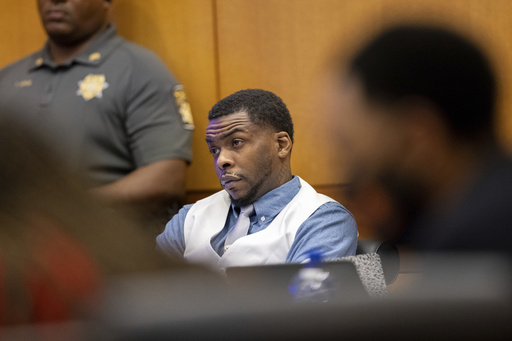
ATLANTA — On Monday, prosecutors presented their case against the last two defendants in an extensive trial linked to gang activity and racketeering, alleging that they committed murder on behalf of a street gang that was co-founded by rapper Young Thug. The defense, however, counters that the state’s claims are built on selectively chosen social media content and song lyrics, as well as unreliable witness accounts, which portray a distorted image of young men striving to escape challenging environments through music rather than a life of crime.
The decision now lies in the hands of the jury, who will evaluate whether to convict Shannon Stillwell and Deamonte Kendrick, known as Yak Gotti, on multiple charges including gang activity, murder, drug offenses, and weapon possession. Originally, 28 individuals were indicted for conspiracy under Georgia’s Racketeer Influenced and Corrupt Organizations Act, with the trial for six of them commencing a year ago. Among those initially implicated, four—including Young Thug—pleaded guilty last month, while Stillwell and Kendrick rejected plea deals after extensive negotiations and opted not to present evidence or call witnesses in their defense.
The trial has faced numerous setbacks and complications. Judge Paige Reese Whitaker, who replaced the initial judge recused from the case, has exhibited frustration with the prosecution’s handling of evidence and witness testimonies. Prosecutors charge the two defendants with the murder of Donovan Thomas Jr., also referred to as “Big Nut,” who was killed in an Atlanta barbershop in 2015 as part of a conflict involving rival gangs. Additionally, Stillwell faces charges related to the 2022 murder of Shymel Drinks as part of retaliatory actions after the deaths of two other alleged gang members.
The prosecution has alleged that Young Thug, whose real name is Jeffery Williams, co-founded a group known as Young Slime Life (YSL) in 2012, which they assert is linked to the wider Bloods gang. Young Thug’s record label shares the same name, YSL (Young Stoner Life). Kendrick’s music, particularly on popular tracks such as “Take It to Trial” and “Slatty,” has also been highlighted in the trial proceedings as evidence supporting gang affiliations.
Defense attorney Doug Weinstein contends that it is unjust for the prosecutors to target the defendants—who are all Black—based on their musical expressions. Prosecutor Simone Hylton responded that the case revolves around “real bodies” and is not simply about lyrics, emphasizing that they are pursuing gang members who have inflicted violence on communities within Fulton County, many of which are communities of color.
Prosecutor Christian Adkins described YSL as a violent organization that utilizes methods of “deception, intimidation, destruction, and death” to operate. He referenced social media evidence that purportedly shows members involved in rival gang killings, asserting that the gang’s clothing and tattoos serve as identifiable markers of their affiliation.
In response, Weinstein and Stillwell’s attorney, Max Schardt, argued that the prosecution has amalgamated various unrelated crimes into the indictment without establishing a cohesive connection to a criminal enterprise. Schardt contended that the evidence presented by the state does not hold up under scrutiny and fails to accurately represent the complexities of the situation.
During the trial, some alleged YSL affiliates testified that they provided false statements to law enforcement to avoid significant prison sentences. Schardt posited that one of these witnesses may have been involved in Thomas’s murder and had constructed a narrative involving Stillwell and Kendrick to deflect blame from himself. However, Hylton refuted that, claiming witnesses only lied when in front of those they had implicated, not when speaking to police.
Weinstein also noted that before Kendrick became embroiled in accusations tied to Young Thug, he was focused on his rap career, finding a path away from his difficult past after his aspirations of playing football at the University of Georgia did not pan out. He highlighted that Kendrick was not even present during the drive-by shooting that killed Thomas. Conversely, prosecutors maintain that Kendrick was instrumental in directing other gang members to Thomas’s location prior to the fatal incident.
Schardt argued that surveillance footage proves Stillwell’s innocence, illustrating that he exited the scene before the shooting of Drinks occurred and that no gunshot residue was discovered in his vehicle. However, Hylton claimed that the footage demonstrates Stillwell’s rapid escape from the site, traveling at high speeds while allegedly firing shots into Drinks’s car.
Of the original 28, nine defendants, including rapper Gunna, agreed to plea deals before the trial commenced, while charges against 12 others are still pending. Additionally, one defendant’s charges were dismissed after he was convicted of an unrelated homicide.
Jurors are anticipated to commence their deliberations on Tuesday, and if a verdict is not reached by Wednesday, they will reconvene after the Thanksgiving holiday.
